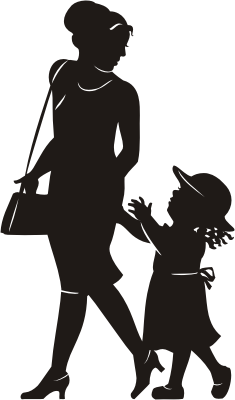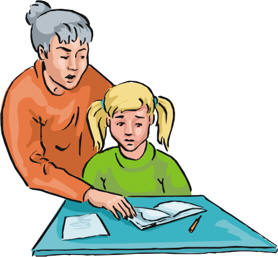-
- Punishment or Discipline
By Barrington H. Brennen, August 2005,
September 5, 2017, January 2021
Question:
Dear Sir: What can we really do to help our children be more disciplined and to
grow up as non-violent citizens?
Answer: Dear Reader: Would you
believe that the key answer to solving the problem of violence is to start
training our children from the minute they are conceived—in the womb. Research
indicates that the unborn child can hear what is being said outside the womb
from as early as eighteen weeks after conception. She may not understand what is
being said; however, she can
 distinguish different voices, feelings, and moods.
We have the Biblical record of John the Baptist when he was only six months in
his mother’s womb "leaping for joy." The documentary, "Silent
Scream," video clips of actual abortions show unborn infants pulling away
from suctions tubes and screaming for "help" during the deadly ordeal.
Unborn infants can feel and hear. We also know that the attitude of the mother
during pregnancy, the relationship with the father of the child, and the
environment in which the mother lives (whether her home is filled with hostility
or whether it is peaceful) can also influence the psychological and physical
development of the unborn fetus. distinguish different voices, feelings, and moods.
We have the Biblical record of John the Baptist when he was only six months in
his mother’s womb "leaping for joy." The documentary, "Silent
Scream," video clips of actual abortions show unborn infants pulling away
from suctions tubes and screaming for "help" during the deadly ordeal.
Unborn infants can feel and hear. We also know that the attitude of the mother
during pregnancy, the relationship with the father of the child, and the
environment in which the mother lives (whether her home is filled with hostility
or whether it is peaceful) can also influence the psychological and physical
development of the unborn fetus.
PRE-PARENTING CLASSES NEEDED
How then do we start to help our mothers and fathers so that they can provide
a more wholesome environment for the development of their children? This brings
me to a most profound statement— We should start training our children at
least 20 years before they are born. Research now tells us that we develop our
major character traits during the first five years of our lives. If this is
true, then while we are training our little children, we are also training our
grandchildren. The habits and traditions we will instill during those early
years will stay with the children for the rest of their lives, and will
influence how those children will bring up their own children.
Many of our teenagers today lack discipline and have parents who do not care
much about them. Thus, creating a deadly formula for violence. It is then
critical for churches, schools, civic organizations, social clubs, and concerned
groups, to provide pre-parenting classes for teenagers and effective parenting
classes for young married couples. More and more people are being convinced that
to reduce the risk of marital discord and breakup, pre-marriage education is
necessary. In the same vein we must be convinced that to reduce the risk of
raising undisciplined violent children, we must teach children and adults how to
parent. I call this pre-parenting education.
THE TRUE MEANING OF DISCIPLINE
Discipline is not synonymous with punishment. It is obvious that the word
discipline appears when we talk about violence. Violence is a result of a lack
of discipline. What is discipline? Discipline is helping children develop
self-control. It is encouraging children, guiding them, helping them feel
good about themselves, and teaching them how to think for themselves. Note that
I said "children" and not adults. This is because the true meaning of
discipline includes three important points:
- Discipline is a PROCESS not
just single events. This process begins from the birth of the child (after
it would have started with the adult years before). Its is helping the children
to make intelligent choices each step of the way. It is understanding the
developmental stages of children and knowing what to expect from them during
each stage.
- Discipline is an ENVIRONMENT not just circumstances. This
is providing intelligent guidelines and limits that help to make children feel
loved and lovable, secure and free. It is having homes where children are valued
and are treated as intelligent beings and not as mute dogs.
- Discipline is
a LIFESTYLE not just a one-shot deal or fashion. I like the word lifestyle
because it suggests that everything we do or think is a part of the entire
process of discipline. This includes the words we speak, the time we eat, what
we eat, what we watch on television, how we respond to disappointments, how we
handle differences among ourselves, how we feel about ourselves, how we feel
about others, how we treat others, how we control anger, etc.
Many parents think of discipline as physical punishment. Physical
punishment is one of the methods parents use to inflict pain in order to correct
a specific wrong doing. Note that physical punishment does not develop
character. It only seems to works after parents have understood the
process of discipline and provide the environment of discipline for their
children during the first five to ten years of their lives. If a young child is
allowed to go to sleep any time he wishes, eat at anytime, eat anything, and
watch whatever he wants to on television, when the child becomes a teenager and
chooses to do terrible things it is very difficult or nearly impossible for
parents to correct wrong doing. I hear many parents of teenagers complain how
they do not know what to do with their son or daughter. "They are so
rebellious," these parents say. I have discovered that most of these
parents did not understand the process of discipline and did not create the
environment of discipline when their children were young. Thus they allowed
their children to do what they wanted at anytime, then brutally punished them
for every little inconsistency along the way. This is a formula for violence. television, when the child becomes a teenager and
chooses to do terrible things it is very difficult or nearly impossible for
parents to correct wrong doing. I hear many parents of teenagers complain how
they do not know what to do with their son or daughter. "They are so
rebellious," these parents say. I have discovered that most of these
parents did not understand the process of discipline and did not create the
environment of discipline when their children were young. Thus they allowed
their children to do what they wanted at anytime, then brutally punished them
for every little inconsistency along the way. This is a formula for violence.
I've noticed that teachers or
parents who use physical punishment in public (and in
private) or in front of the class, are usually
demonstrating a misuse of power and control.
Sometimes, the instigators of the physical punishment
think they are being embarrassed by the "rude"
student/child, so they have to show "who is in charge."
Hence, it is really a power struggle between the
parent/teacher and the child.
Teachers and parents must be
reminded that they are by default, due to the age
difference and authority, already in control of the
child/student. Therefore, do not abandon
your "control" by beating/physically punishing the
child/student.
INTERNAL VALUES NEEDED
Discipline is helping children develop self-government. Learning
self-government and personal responsibility means acquiring what psychologists
call an internal locus of control. This means that the source of control
is internal--the individual acts out of a sense of personal value and
commitment. External locus of control mean that the individual depends on
external rewards and punishments to behave as the authority or parent wishes.
When the external locus of control is not present--that is the external
force--then the person acts impulsively. Children who are taught or gradually
acquire an internal locus of control-- or reasoning skills--will avoid
misbehavior because they believe it is wrong. They will try to act consistently
with a set of standards they have learned from their parents and have made their
own.
I hope you are beginning to understand when that discipline is a process, an
environment, and thus a lifestyle. May you begin a new world of discipline in
your home and school today.
Send your questions or comments to
Barrington H. Brennen,
question@soencouragement.org or call 242-327 1980 or snail mail:
P.O. Box CB-13019, Nassau, The Bahamas. Barrington Brennen is a
marriage a counseling psychologist and marriage and family therapist.
First
Rules Part
1 Rule Part 2
Rule Part 3
Rule Part 4
|
|